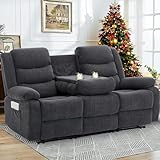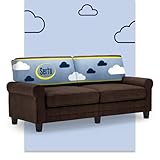Living with arthritis can significantly impact daily comfort, especially when it comes to furniture.
A couch isn’t just a place to sit — for those with arthritis, it can either be a source of relief or a painful obstacle. The right couch can help reduce joint strain, offer ergonomic support, and improve overall quality of life. In this article, we’ll explore the best couches for arthritis sufferers, what features to look for, and some top recommendations based on comfort, accessibility, and therapeutic value.
Why Couch Design Matters for Arthritis
Arthritis affects millions of people globally, with common symptoms including joint stiffness, swelling, and chronic pain — particularly in the knees, hips, spine, and hands. Traditional couches often fall short in accommodating these issues. Low seating, soft cushions, deep seats, and unsupportive backrests can all make it harder for arthritis sufferers to sit down or stand up without pain.
Key problems with regular couches:
- Too low to the ground: Makes getting up difficult.
- Lack of lumbar support: Increases lower back pain.
- Cushions too soft: Cause poor posture and joint misalignment.
- Hard armrests or none at all: Reduce leverage needed to stand.
What to Look for in a Couch for Arthritis
When shopping for a couch suitable for arthritis sufferers, comfort and accessibility should take priority. Here are the most important features to consider:
1. Seat Height
The ideal seat height for arthritis sufferers is usually between 18 to 21 inches. This allows users to sit and stand without too much bending of the knees or hips.
2. Firm but Supportive Cushioning
Memory foam or high-resilience foam cushions are great options. They conform slightly to the body for comfort but remain firm enough to provide support and prevent sinking too deep.
3. Lumbar Support
A good couch should support the natural curvature of the spine. Built-in lumbar support or the ability to use lumbar pillows is essential.
4. Armrests
Sturdy, padded armrests help users push themselves up gently without straining their wrists or shoulders. Avoid armless designs.
5. Adjustability
Couches with adjustable headrests, recline options, or even lift-assist mechanisms can be very helpful, especially for those with more advanced arthritis.
6. Material
Choose hypoallergenic, easy-to-clean fabrics like microfiber, performance linen, or leather. Avoid materials that retain cold, as that can worsen joint stiffness.
Best Couch Types for Arthritis Sufferers
Let’s look at couch styles and specific features that are particularly arthritis-friendly.
1. Power Lift Recliner Sofas
Power lift couches use motorized mechanisms to raise or recline the seat, gently guiding the user into a standing or lying position. They are ideal for severe arthritis cases.
2. Firm High-Back Sofas
High-back sofas with firm cushions and good lumbar support help reduce back and neck strain. The extra height also makes resting easier for taller individuals.
3. Modular Sofas with Ergonomic Design
Modular couches allow for customization. Add armrests, seat cushions, and support where needed. Some also have integrated features like USB charging and cupholders, minimizing the need to get up frequently.
4. Futons and Sleeper Sofas (with Care)
If selected carefully, a firm, well-supported futon can be comfortable. Sleeper sofas with memory foam mattresses can double as a bed — useful for arthritis patients who need to lie down often.
Top 5 Best Couches for Arthritis Sufferers (2025 Picks)
Here are some of the best-reviewed options that tick the boxes for arthritis-friendly features:
1. Signature Design by Ashley Yandel Power Lift Recliner
- Type: Power lift recliner
- Pros: Smooth power lift and recline function, padded armrests, high back
- Why It’s Great: Highly rated for people with mobility issues, including arthritis. The dual motor lets you recline and lift independently, reducing stress on knees and hips.
2. La-Z-Boy Anderson Reclining Sofa
- Type: Manual or power reclining sofa
- Pros: High back, firm cushions, customizable options
- Why It’s Great: Classic La-Z-Boy comfort and adjustability. Great for those with mild to moderate arthritis who prefer a more traditional sofa look.
3. Serta Copenhagen 78″ Sofa
- Type: Standard 3-seater
- Pros: Firm, supportive cushions, easy assembly, good seat height
- Why It’s Great: A budget-friendly, no-fuss couch that provides good support and is not too deep or low.
4. Human Touch Perfect Chair PC-420
- Type: Zero gravity recliner
- Pros: Puts body in a neutral position, adjustable, reduces joint pressure
- Why It’s Great: Though more of a chair than a full sofa, it offers unparalleled joint relief for arthritis sufferers, especially in the back and knees.
5. Burrow Nomad Sofa
- Type: Modular sofa
- Pros: Customizable, medium-firm cushions, solid wood frame, high seat height
- Why It’s Great: Clean modern design with practical functionality. You can add an ottoman, chaise, or additional lumbar support.
Tips for Setting Up an Arthritis-Friendly Living Room
Choosing the right couch is just the beginning. Here are a few additional tips to enhance comfort:
1. Use Supportive Accessories
- Lumbar pillows: For extra back support
- Seat wedges or risers: Raise the seat height
- Knee cushions or bolster pillows: Provide joint relief when lying down
2. Place Couch Near Stability Aids
Install grab bars, a side table for support, or even place the couch next to a wall for additional balance while getting up.
3. Avoid Rugs That Slip
Loose rugs near the couch are tripping hazards. Use anti-slip mats or remove rugs altogether.
4. Opt for Bright Lighting
Good lighting reduces the chance of accidental falls, which is critical for arthritis patients with limited mobility.
Additional Considerations
1. Household Aesthetics vs Comfort
Some arthritis-friendly couches may not win beauty contests, but comfort should always be a priority. Fortunately, many newer designs now blend support with style.
2. Budget
Medical-grade or high-end ergonomic couches can be pricey, but don’t despair. Brands like Serta and Ashley offer affordable models with plenty of support. Financing or buying second-hand through trusted sources can also help.
3. Try Before You Buy (If Possible)
Wherever possible, test a couch in person. Pay attention to how easy it is to sit down and stand up, whether you feel pressure in your joints, and how your spine feels after sitting for 10-15 minutes.
Final Thoughts
Living with arthritis doesn’t mean you have to sacrifice comfort — or style. By choosing the right couch with proper seat height, firm yet supportive cushions, strong armrests, and accessibility features like lift or recline, you can create a pain-free lounging experience. Whether you’re reading a book, watching TV, or just resting your joints after a long day, the right couch can make a world of difference.
Our top pick? The Ashley Yandel Power Lift Recliner — a versatile and highly supportive option for people dealing with mobility and joint pain.
FAQs
1. What is the ideal seat height for an arthritis-friendly couch?
18–21 inches is ideal. It allows easier sitting and standing, especially for seniors.
2. Are recliners good for arthritis?
Yes, especially power lift recliners. They help reduce joint strain during standing and reclining.
3. Should I choose soft or firm cushions?
Medium-firm is best. It should offer enough support to hold your posture but not be rock-hard.
4. What couch material is best for arthritis sufferers?
Easy-to-clean, hypoallergenic fabrics like microfiber or soft leather are ideal. Heated materials or cushions are a plus for soothing joints.




